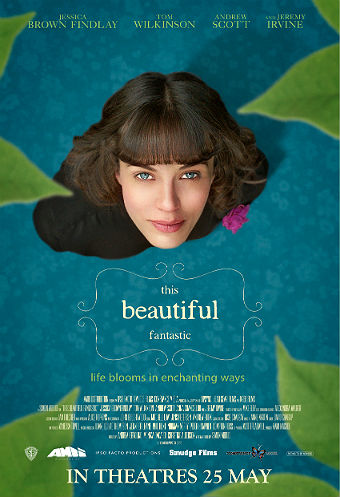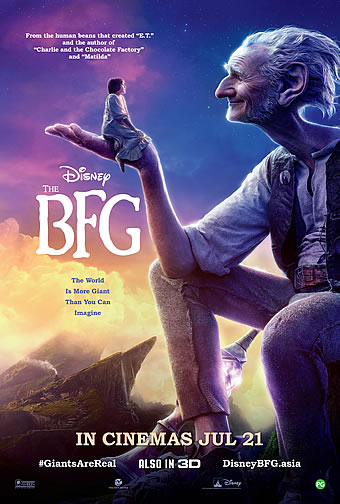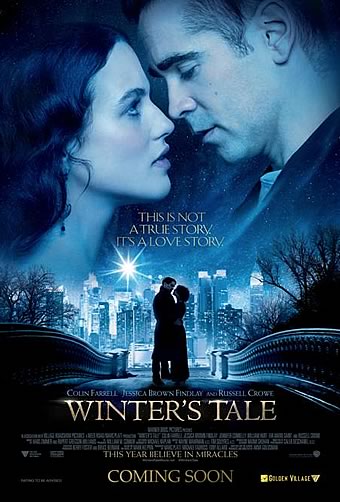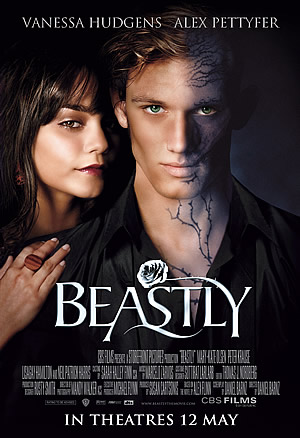THIS BEAUTIFUL FANTASTIC (2016)
Genre: Drama
Director: Simon Aboud
Cast: Jessica Brown Findlay, Tom Wilkinson, Andrew Scott, Jeremy Irvine
Runtime: 1 hr 32 mins
Rating: PG
Released By: Shaw
Official Website:
Opening Day: 25 May 2017
Synopsis: This Beautiful Fantastic is a contemporary fairy tale revolving around the most unlikely of friendships between a reclusive, agoraphobic young woman with dreams of being a children's book author and a curmudgeonly old widower, set against the backdrop of a beautiful garden in the heart of London. Bella Brown is a beautifully quirky young woman who dreams of writing and illustrating a successful children's book. Despite her abandonment as a child, the all consuming OCD, the unfulfilled dream, her awful boss at the library and her paralyzing fear of flora and fauna, Bella is down but not out. She has a spark, an edge, a talent and a voice that we can feel from the get go. This girl has a preternatural survival instinct, having been found in the middle of winter in the middle of Hyde Park as a babe. When Bella is forced by her landlord to deal with her neglected garden or face eviction, she meets her nemesis, match and mentor in Alfie Stephenson, a cantankerous, loveless, rich old man who lives next door and is an amazing horticulturalist.
Movie Review:
Despite the somewhat puerile choice of title, This Beautiful Fantastic proves to be an enchanting little concoction of magic realism and wide-eyed positivity in equal parts, the result of which feels like a crisp garden breeze in the wild jungle of humourless films that have glutted the silver screen of late. Fans of British television series Downton Abbey will no doubt recognise Jessica Brown Findlay (of Lady Sybil fame), who plays the lead character Bella, only this time on a wholly different kind of period set.
Faithful to the fable narrative it so aspires to, writer-director Simon Aboud’s film begins with a voiceover laying bare the whimsical details of Bella’s early life, enacted with all the stylings of a slightly less irreverent Amélie (2001). Essentially described as the “oddest of oddballs”, the story goes that she was discovered as a baby nestled in a makeshift box on the banks of Hyde Park’s lake, surrounded by ducks and bulrushes, before she was left to be raised in the care of Catholic nuns.
Cut to now – Bella has blossomed into an independent young lady with a penchant for drab vintage dresses and a compulsion for orderliness, which is depicted in the film with painstaking intricacy – from her preoccupation with the symmetry of food items laid out on her breakfast platter to the number of times she checks the lock of her door before leaving the house.
Inexplicably though, our heroine has trouble reaching her workplace on time, where she is otherwise generally competent as a librarian. Her respite from her general lack of job fulfilment and her boss’ constant rebukes by day? By night, she alternates between building pipe dreams of being a children’s book author and pining for Billy, a faux-geeky inventor with a millennial-hipster sartorial aesthetic (played by Jeremy Irvine of War Horse – when have awkward nerds ever come this dishy?) and who frequents her library to chat her up at every chance.
We also discover that the narrator at the start is in fact her hugely unpleasant and bilious present-day neighbour Alfie (played by Tom Wilkinson). Bella takes umbrage with the manner in which he ill-treats his Irish home chef Vernon (played by Andrew Scott), a good-natured widower with two daughters and a culinary know-how that rivals an uncanny ability to recite clauses from English employment and property legislation. Consequently, she poaches Vernon from Alfie, who soon realises he cannot tolerate a day without Vernon’s cooking and reaches a truce with agora-botanophobic Bella – Vernon will continue to cook for him while green-fingered Alfie will help her restore her decrepit garden to her landlord’s satisfaction within the allocated time frame.
The small cast of main characters are all quaint and imperfect in their own ways and as stories like these go, Alfie and Bella warm up to each other; cultivate beyond mere shrubbery a genuine amity, and help to smooth out each other’s rough edges. Naturally, the theme of gardening occupies much of the film while the three men in her life impart invaluable lessons on life, love and friendship. We watch as Bella emancipates from the trappings of her crippling phobias and cocooned ways while her dream of penning a fairy tale writes itself within this fairy tale of a film.
If it all sounds like a lot of sentimental slush, that’s because to a considerable extent it is, and this is also where the film is blighted by the same pitfall that plagues the most well-worn of feel-good fairy tales – namely, predictability. The metaphor of gardening in itself strains to be original while being exercised with an almost unabashed lack of subtlety (it’s fertile ground – pun intended, since we’re at it – for the obvious connotations of sowing, growing, nurturing and blooming). Plot-wise, the events of the story unfold with little sophistication or surprise.
In addition, the relationships between Bella and the men in her life don’t quite feel deeply developed enough; for example, the film feigns an interest in portraying Vernon’s affection for Bella as something a little more than platonic, and then abandons the idea altogether. And when you think about it, Bella’s greatest trials seem more like trifles – they consist of getting her garden back in shape, surmounting writer’s block, dealing with the tizzies of puppy love. The management of mental health issues are reduced to mere eccentricities that she has to get a handle on; at one point, she does have to deal with loss, but this is dealt with towards the end and only briefly (we won’t spoil it for you here). In other words, all the characters wind up feel a little flatter than they ought to.
Perhaps it’s easier to think of This Beautiful Fantastic as one best suited for the tween demographic, whether or not that’s what Aboud had in mind. Considering that the film’s strongest language consists of choice words such as “bloody” and “bastard”, and that the only thing remotely sexual that happens is a quivering first kiss and little more, this is all-too-safe PG material through and through. Even if it’s meant to be a saccharine fairy tale that shies away from being an Amélie rip-off, one almost wishes there were darker or more subversive elements to shake things up a little à la the likes of other young adult fantasy works by Neil Gaiman (e.g. the film adaptations of Coraline and Stardust) or more recently, Tim Burton’s big screen version of Ransom Riggs’ Miss Peregrine's Home for Peculiar Children.
Yet, despite all of the above and somehow, the film has succeeded in created a visually-pleasing celluloid microcosm of quintessential Englishness that still charms with its fantastical elements, vibrant hues and warm characters (performed by immensely likeable actors), so much so that we are willing to overlook much of the film’s flaws. From the ambiguously period-less fashion choices to the architecture and landscapes, down to the very British quirk of carrying thermos flasks of tea, the ethereal aesthetics of Bella’s world is a delight for the senses.
Indeed, props should be given to the cinematography of This Beautiful Fantastic, a true highlight of the film. When we are first introduced to Alfie’s gorgeous horticultural achievements, we are awed by the explosion of floral colours and the trippy psychedelia induced by the director of photography Mike Eley, with his deliberately out-of-focus close-up shots of Alfie’s garden in all its blooming glory. And in an age where so many films come replete with heavy-handed CGI sequences, a wondrous scene where a flapping mechanical bird (one of Billy’s idiosyncratic inventions) takes a literal flight of fancy reminds us that simplicity can equally inspire.
Depending on whether you view this quirky flick with the jaded weariness of a cynical adult or adjust your personal expectations for the consumption of tweeness, this fairy tale will either quickly feel quite uninspiring, or it may just quietly win you over with its heart, of which it has in plenitude. We opted for the latter and were all the better for it.
Movie Rating:




(Reminiscent of and yet lacking the edginess that made 2001’s Amélie successful, This Beautiful Fantastic feels more like an airy French soufflé than a hearty English pudding. Infused with lightly fantastical elements, this whimsical comedy-drama should nonetheless charm you with its earnestness and visuals)
Review by Tan Yong Chia Gabriel
You might also like:

Movie Stills
 and Alfie (Tom Wilkinson) in the rain.jpg)
 beekeeper outfit2.jpg)

.jpg)


